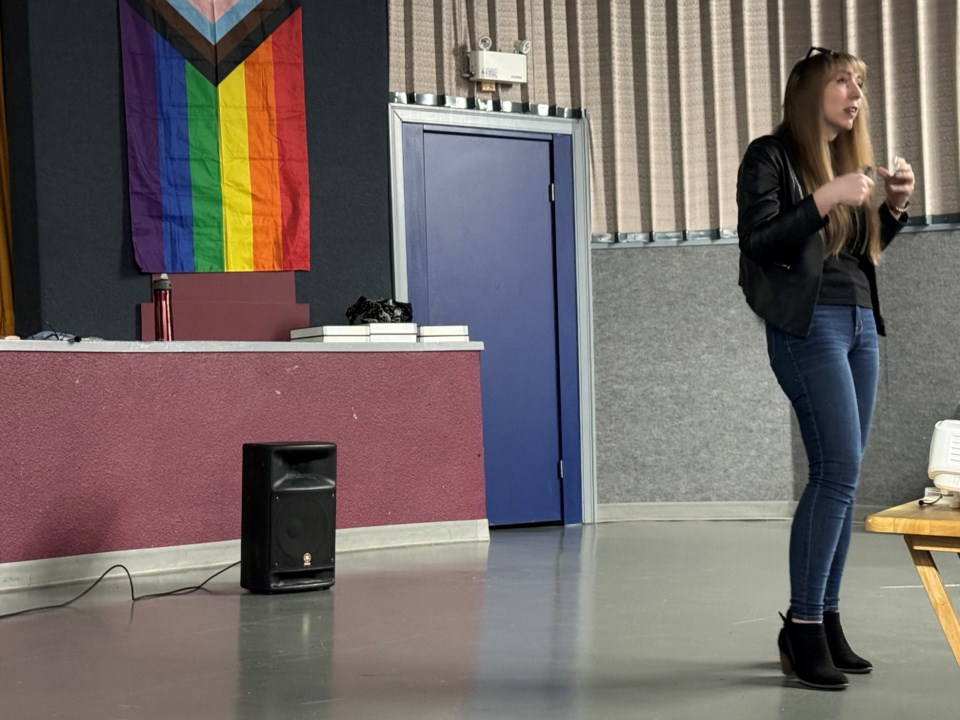ST. PAUL – On April 8, Pride St. Paul hosted a presentation and information session to discuss the gender and sexuality policies announced by Premier Danielle Smith in February.
Lesley Frick, co-chair of Pride St. Paul, says the group noticed some misinformation and harmful rhetoric being perpetuated around the policies and its implications.
“We’re just hoping to get some factual information to folks who are interested, hoping that we can have some more constructive and safe conversations,” says Frick. “We also want to create a space in which people feel comfortable asking questions.”
Frick says that sometimes people may be hesitant to ask questions regarding gender identity, which may result in a person simply believing what they hear on the internet, leading to the spread of misinformation.
“We're hoping that this will help encourage folks to have conversations around the policies,” and gender identity as a whole, says Frick.
Alex Marshall, who previously worked as the rural education coordinator at Fyrefly Institute for Gender and Sexual Diversity, a non-profit housed at the University of Alberta, was invited to speak at the event.
Marshall says part of being in a community is helping create a safe and welcoming space for everybody - that includes 2SLGBTQ+ people.
“We’re definitely encountering 2SLGBTQ+ people. They’re part of our communities.”
She explains that 13 per cent of Canadians are 2SLGBTQ+.
Marshall says there is much misinformation surrounding 2SLGBTQ+ inclusivity. For example, a recommendation often suggested by the 2SLGBTQ+ community is access to more inclusive curricula in schools.
Some people mistake this as showing “pornography to kids,” which is not, in any way, reflective of reality, she says. “When we talk about inclusive materials [in schools], it’s always age-appropriate,” she affirmed.
“It’s just understanding that there is diversity in the world, and that there’s lots of different people.”
Offering an example, in a kindergarten class, a 2SLGBTQ+ inclusive book may portrait two mothers or two fathers, as some children may have. This portrayal simply communicates that, “This is an OK family,” says Marshall.
“We shouldn’t pretend like diversity doesn’t exist just because some people don’t like it... that’s just the reality of it,” she adds.
She says others argue that showing materials exploring gender and sexual diversity is not appropriate to children. It’s an argument analogous to how the state of Mississippi in the United States banned ‘Sesame Street’ in the 1970s for showing integrated neighborhoods, or interracial cast.
“The reality is we’re just showing them the reality of the world.”
Alberta gender policies
In February, Premier Danielle Smith announced new policies surrounding youth gender identity and health care.
Marshall argues many of these policies are based on misinformation. She says the policies were written without input from communities they affect, such as the Provincial Advisory Council for Sexual Orientation, Gender Identity and Expression – one of the four Provincial Advisory Councils in the province advising on province-wide health programs.
“Nobody checked in with us, nobody asked us, nobody let us know that this was happening,” says Marshall.
One policy Marshall touched upon is the policy that requires children 15 and under to have parental consent if they change their preferred name or pronouns in school, and how the parents of youth aged 16 or 17 will be notified if they change their preferred name or pronouns.
Marshall says this only affects kids who do not feel supported at home.
Medical autonomy
Among the new policies also include a ban for all gender-affirming surgeries for minors aged 17 and under. Marshall says the policy implies gender-affirming surgeries happen to youth in Alberta, which she says isn’t the case, and perpetuates harmful misinformation.
“It just isn’t happening. Medical transition for youth is really rare and we’re talking about... hormones and puberty blockers,” says Marshall. Hormone and puberty blockers as a medical transition method for youth are rare, and youth who choose to do so must wait for years, she says.
Marshall says medical organizations like World Professional Association for Transgender Health (WPATH) also do not recommend gender-affirming surgery for youths. WPATH recommends transgender people reach adulthood to be a candidate for gender-affirming surgeries.
Sports
Marshall says the policy banning transgender youth from competing in women and girls' sports affect very few youths, “But affects them harshly. So, when we think about sports in our schools... who is this for?”
She says, having worked with many school boards, many transgender kids don’t want to play sports. “They’re terrified.”
Marshall says the policy bars transgender youths from benefiting from sports and learning about camaraderie and teamwork.
The policy can also potentially harm cisgender women, says Marshall, explaining there are many women who play sports that may not seem “super feminine” to other people.
It encourages people to accuse cisgender women of their gender simply because they think they may not be feminine. Marshall used the case of a nine-year-girl whose gender was questioned during a track-and-field event in British Columbia by a man, demanding the parents provide proof of gender.
Marshall says inclusive practices are about providing safe spaces for everyone, reducing bullying, and an inclusive practice should benefit “all people.”
She adds, “We want to create spaces where people can tell us who they are.”



